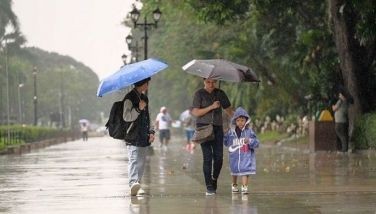Manila hosts theater summit
May 17, 2006 | 12:00am
In the 58-year history of the International Theater Institute, the Philippines is the first Southeast Asian nation to host the ITI World Congress to be participated in by artists from its 100 member-states. The National Commission for Culture and the Arts and the Philippine Center for International Pen (ITI Philippines) are spearheading preparations for this momentous event.
UNESCO Director-General Koichiro Matsuura is arriving on May 22 to chair one of the highlights of the Congress — the Leaders’ Forum. UN officials, Ministers of Culture, UNESCO Goodwill Ambassadors and Artists for Peace will discuss the UN Millennium Development Goals (MDGs) of eradicating poverty and covering concerns on children, women, health, AIDS, the environment, peace, partnership for development and cultural diversity and the role of the performing arts in creating awareness and shared responsibility in the achievement of these international commitments in cooperation with the UNESCO National Commission of the Philippines and the Department of Foreign Affairs.
Born on Sept. 29, 1937 in Tokyo, Japan, Matsuura studied law at the University of Tokyo and economics at Haverford College in Pennsylvania and speaks English, French and Spanish. Matsuura had a distinguished diplomatic career beginning in 1959 in the Japanese Ministry of Foreign Affairs (MOFA). During these years, Dr. Matsuura became involved with development work — chiefly with the Organization for Economic Cooperation and Development (OECD), Paris (1968-72), Development Cooperation Division, MOFA (1975-1977), Aid Policy Division, MOFA (1980-92) and Economic Cooperation Bureau (1988-90). He also had diverse diplomatic assignments from West Africa to Asia, the Americas and Europe.
In one of his first addresses as UNESCO DG, Matsuura outlined his vision of how UNESCO as an organization figures in international development as the lead agency of the UN system on education, culture, sciences and communication.
During International Education and Global Challenges Forum to Launch US International Education Week in Washington, DC in 2000, he made these remarks: "The world must learn how to live, and work and exist together — in peace, with an appreciation for the diverse cultures and perspectives and wonderful creativity of mankind. Such learning is key to prosperity, opportunity, productivity and human progress. It is key to the changes in cultures and attitudes and commitments, at all levels, which lead to reduced poverty and inequity, to respect for human rights and to increased participation for open, confident, resilient societies."
Matsuura was the chairman of the World Heritage Committee of UNESCO (1998-99) based in Paris, France. He is now on his second term as UNESCO director-general, a post he won by an overwhelming majority during the 33rd Session of the General Conference.
Matsuura’s leadership in UNESCO introduced administrative and programming reforms.
In the first year of Matsuura’s reforms, the number of divisions in UNESCO was cut in half, allowing a corresponding halving, at the same time, of the number of field units from a 1999 high of 79 to 52 today. Today, more UNESCO staff and funds are at work in the field.
Since the Sept. 11, 2001 terror attacks, when resources for international development became scarce, Matsuura focused the resources of UNESCO on five main programs — Education for All, freshwater resource management, cultural preservation, bioethics, and increasing access to the new information and communication technologies, which saw an increase of 50 percent in funding. At the same time, results-based budgeting and programming were established. All programs are subject to monitoring and evaluation by internal and external auditors.
As UNESCO’s effectiveness grew, member-states and private partners have voluntarily increased their support with extra-budgetary funding more than doubling to over $200 million per year. Each UNESCO program area operates from a combination of assessed and voluntary support. Leading UNESCO partners include the UN Foundation, L’Oreal, Microsoft and Intel, working on areas ranging from biodiversity to Internet access to support for women in the sciences.
Aside from mobilizing international cooperation to support the Education For All (EFA) program, Matsuura is known for pushing to the forefront of the world’s agenda the "Dialogue Among Civilizations," spawning other initiatives and projects worldwide including the most recent "Interfaith Dialogue." He was also instrumental in gaining international assistance for the preservation of Philippine World Heritage Sites. For the culture sector’s most recent program on Intangible heritage, the "Hudhud" chant of the Ifugao and the Darangen epic of Mindanao were both proclaimed as Masterpieces of Oral and Intangible Heritage of Humanity which should be preserved in order to protect the diversity of cultures and man’s rich history. Matsuura also gave the Philippines the honor of hosting the 2002 World Press Freedom Day, the first for the Asia-Pacific Region.
Matsuura will be conferred an Honorary Doctor of Laws Degree by the UST academic community in the afternoon of May 22.
Other activities lined up as part of the ITI Congress are World Festival of Drama Schools in which 12 international theater groups from countries such as Mexico, India and Romania will have the opportunity to share experiences with theater groups around the Philippines. Workshops will run until May 30, 2006.
Another major meeting is the 2nd Ministerial Meeting on Asian Media Content and Creative Industries on May 26-27 to be participated in by the ministers of culture from Asian countries.
The afternoon sessions of the Congress will be devoted to the meetings of the 10 committees of ITI, namely Communication, Cultural Identity and Development, Dance Theater, Dramatic Theater, Monodrama Theater, Music Theater, New Projects, Playwrights Forum, Theater Education and Young Theater Practitioners.
UNESCO Director-General Koichiro Matsuura is arriving on May 22 to chair one of the highlights of the Congress — the Leaders’ Forum. UN officials, Ministers of Culture, UNESCO Goodwill Ambassadors and Artists for Peace will discuss the UN Millennium Development Goals (MDGs) of eradicating poverty and covering concerns on children, women, health, AIDS, the environment, peace, partnership for development and cultural diversity and the role of the performing arts in creating awareness and shared responsibility in the achievement of these international commitments in cooperation with the UNESCO National Commission of the Philippines and the Department of Foreign Affairs.
Born on Sept. 29, 1937 in Tokyo, Japan, Matsuura studied law at the University of Tokyo and economics at Haverford College in Pennsylvania and speaks English, French and Spanish. Matsuura had a distinguished diplomatic career beginning in 1959 in the Japanese Ministry of Foreign Affairs (MOFA). During these years, Dr. Matsuura became involved with development work — chiefly with the Organization for Economic Cooperation and Development (OECD), Paris (1968-72), Development Cooperation Division, MOFA (1975-1977), Aid Policy Division, MOFA (1980-92) and Economic Cooperation Bureau (1988-90). He also had diverse diplomatic assignments from West Africa to Asia, the Americas and Europe.
In one of his first addresses as UNESCO DG, Matsuura outlined his vision of how UNESCO as an organization figures in international development as the lead agency of the UN system on education, culture, sciences and communication.
During International Education and Global Challenges Forum to Launch US International Education Week in Washington, DC in 2000, he made these remarks: "The world must learn how to live, and work and exist together — in peace, with an appreciation for the diverse cultures and perspectives and wonderful creativity of mankind. Such learning is key to prosperity, opportunity, productivity and human progress. It is key to the changes in cultures and attitudes and commitments, at all levels, which lead to reduced poverty and inequity, to respect for human rights and to increased participation for open, confident, resilient societies."
Matsuura was the chairman of the World Heritage Committee of UNESCO (1998-99) based in Paris, France. He is now on his second term as UNESCO director-general, a post he won by an overwhelming majority during the 33rd Session of the General Conference.
Matsuura’s leadership in UNESCO introduced administrative and programming reforms.
In the first year of Matsuura’s reforms, the number of divisions in UNESCO was cut in half, allowing a corresponding halving, at the same time, of the number of field units from a 1999 high of 79 to 52 today. Today, more UNESCO staff and funds are at work in the field.
Since the Sept. 11, 2001 terror attacks, when resources for international development became scarce, Matsuura focused the resources of UNESCO on five main programs — Education for All, freshwater resource management, cultural preservation, bioethics, and increasing access to the new information and communication technologies, which saw an increase of 50 percent in funding. At the same time, results-based budgeting and programming were established. All programs are subject to monitoring and evaluation by internal and external auditors.
As UNESCO’s effectiveness grew, member-states and private partners have voluntarily increased their support with extra-budgetary funding more than doubling to over $200 million per year. Each UNESCO program area operates from a combination of assessed and voluntary support. Leading UNESCO partners include the UN Foundation, L’Oreal, Microsoft and Intel, working on areas ranging from biodiversity to Internet access to support for women in the sciences.
Aside from mobilizing international cooperation to support the Education For All (EFA) program, Matsuura is known for pushing to the forefront of the world’s agenda the "Dialogue Among Civilizations," spawning other initiatives and projects worldwide including the most recent "Interfaith Dialogue." He was also instrumental in gaining international assistance for the preservation of Philippine World Heritage Sites. For the culture sector’s most recent program on Intangible heritage, the "Hudhud" chant of the Ifugao and the Darangen epic of Mindanao were both proclaimed as Masterpieces of Oral and Intangible Heritage of Humanity which should be preserved in order to protect the diversity of cultures and man’s rich history. Matsuura also gave the Philippines the honor of hosting the 2002 World Press Freedom Day, the first for the Asia-Pacific Region.
Matsuura will be conferred an Honorary Doctor of Laws Degree by the UST academic community in the afternoon of May 22.
Another major meeting is the 2nd Ministerial Meeting on Asian Media Content and Creative Industries on May 26-27 to be participated in by the ministers of culture from Asian countries.
The afternoon sessions of the Congress will be devoted to the meetings of the 10 committees of ITI, namely Communication, Cultural Identity and Development, Dance Theater, Dramatic Theater, Monodrama Theater, Music Theater, New Projects, Playwrights Forum, Theater Education and Young Theater Practitioners.
BrandSpace Articles
<
>
- Latest
- Trending
Trending
Latest
Trending
Latest
Recommended






























